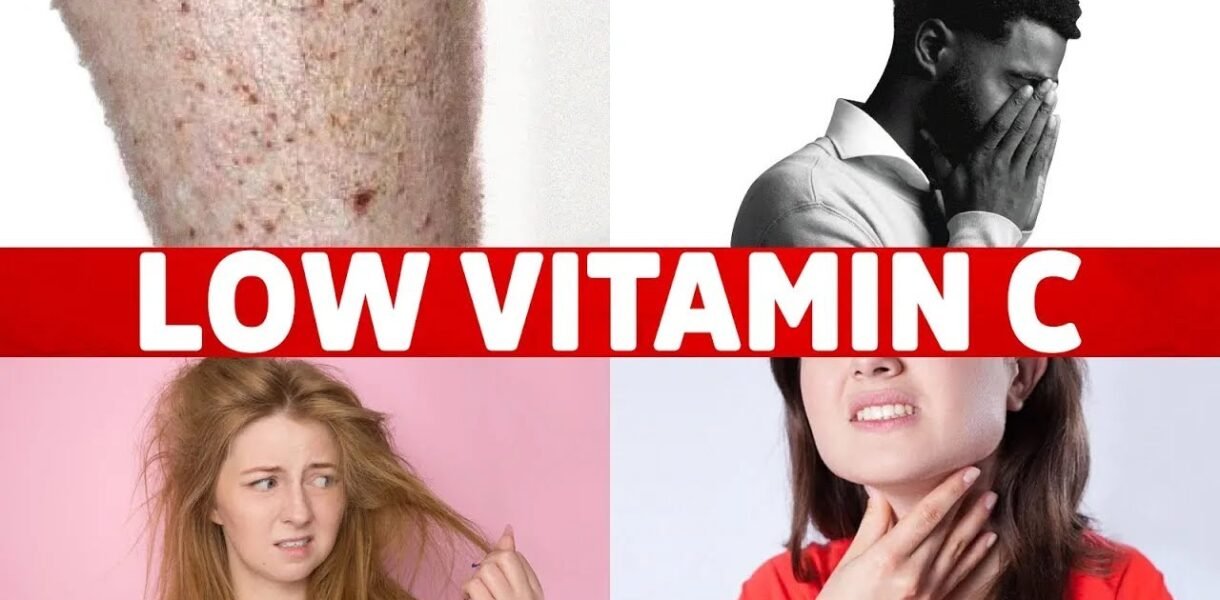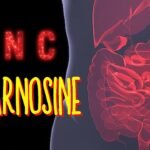Table of Contents
You might know that vitamin C deficiency could cause a lowered immune system. But do you know about these surprising vitamin C deficiency symptoms?
I’d like to share with you some really unusual symptoms that are associated with a vitamin c deficiency , things that you probably have never heard before .
Commonly known vitamin C deficiency symptoms
You may know if you’re deficient of vitamin C , you’re going to get bleeding gums or you might get tired or you might have a loss of collagen that can show up in a lot of different ways with your skin , joints , tendons , ligaments , things like that .
You also probably know that people take vitamin C when they get sick because a deficiency can create a lowered immune system .
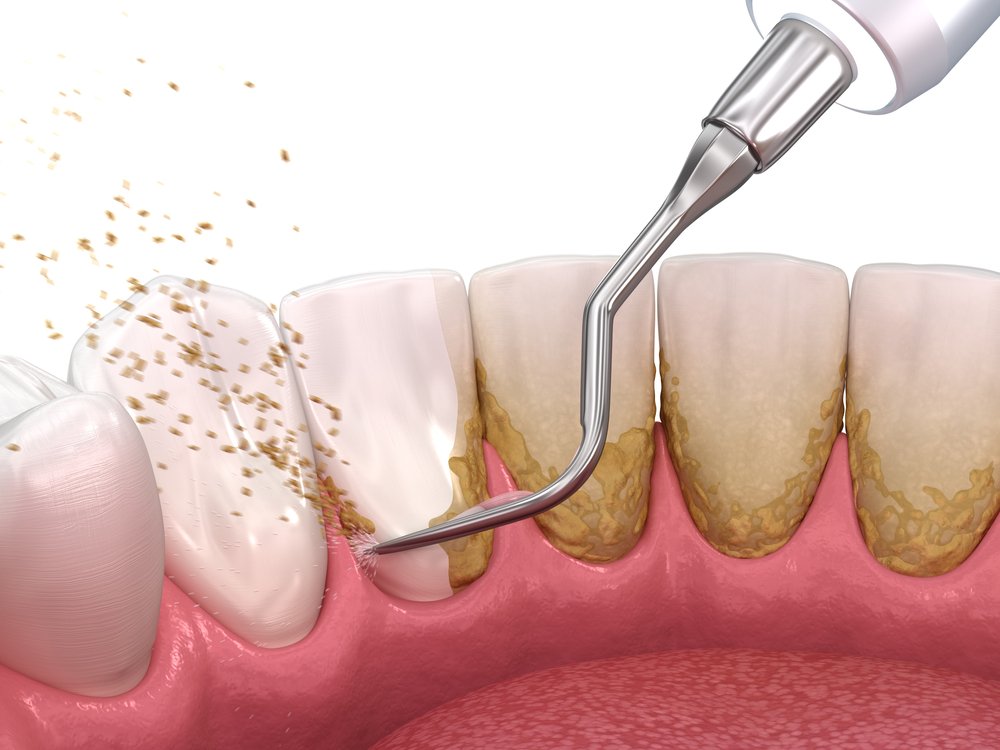
I recently did a topic talking about vitamin C deficiencies and increasing your risk to getting biofilms , which can actually be the plaquing or tartar in your teeth .
What are vitamins, and what do they do?
But I think what’s even more important is to understand what vitamins really are .
What actually does a vitamin do ?
Many people don’t really know .
They know it’s associated with their health .
But what is that vitamin doing in your body ?
Vitamins are cofactors .
Now what is a cofactor ?
It’s something that works with 15 different enzymes .
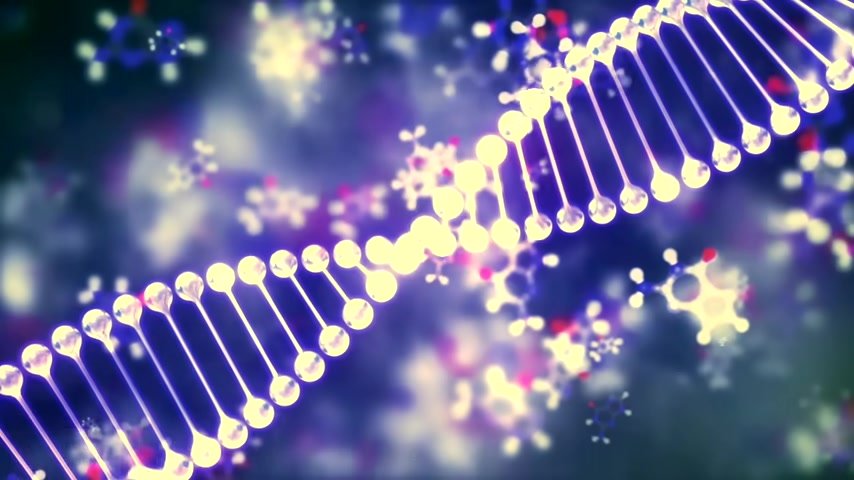
Without vitamins and certain minerals , these enzymes can’t work .
Now what happens when you’re deficient in vitamin C is your body’s gonna start allocating the vitamin C that you have to just the essential enzymes to keep you alive .
Not all of them .
So this is the reason why some people have certain symptoms of a vitamin deficiency , but not others .
They may have a subclinical deficiency , but they don’t have a major deficiency .
But you do have to realize that if you completely run out of vitamin c , you will die .
It’s very fatal .
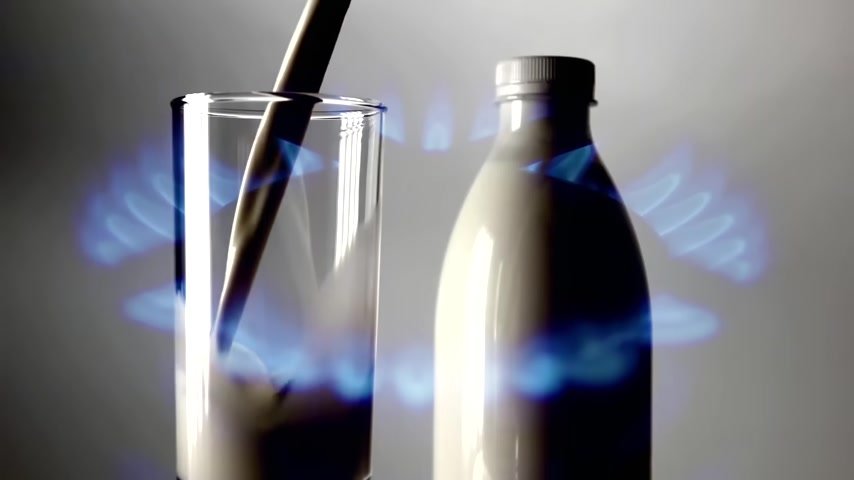
You know , scurvy , which is a severe vitamin c deficiency , became a really big problem when they started to use pasteurization , like for milk and giving it to babies .
Babies would end up with scurvy .
So heat does degrade vitamin c .
Lesser-known symptoms of vitamin C deficiency
Now that you have that information , let’s go through some symptoms that you probably never connected with a vitamin c deficiency .
Number 1 , hypochondria .
That’s right .
Hypochondria is a symptom of a vitamin c deficiency , which is pretty wild .
And I’m gonna put the references down below .
So if someone’s a deficient vitamin c , they can literally be kind of paranoid thinking that they have every single disease around when they really don’t .
That’s interesting .
Depression is another symptom of a vitamin c deficiency .
This next one is called perifollicular hyperkeratosis .
Now what is that ?
Peri means around the follicle , like the hair follicle .
And hyperkeratosis is kinda like a roughened red little scaly , skin lesion that is around the hair follicles .
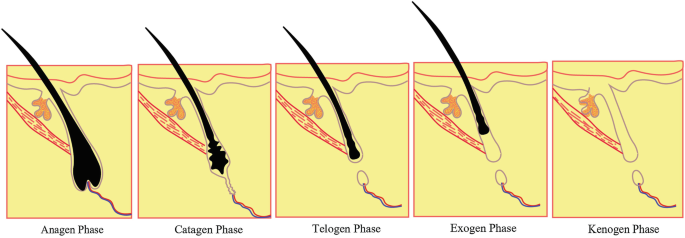
And sometimes the hair follicle coils .
That is a vitamin c deficiency .
So if you have it , you should start taking vitamin c .
Number 4 , anemia .
We think iron , b 12 , but we don’t really think vitamin c .
A vitamin c deficiency can cause anemia .
Dry hair , inflamed veins as in spider veins , shortness of breath .
Also , vitamin c is needed for the adrenals .
So you can have a problem with your adrenaline if you don’t have enough vitamin c .
Foods rich in vitamin C
Now where do we get vitamin c ?
It’s in fruits and vegetables .
Now there is some vitamin c in beef liver , but it’s only like 27 milligrams per 100 grams of liver .
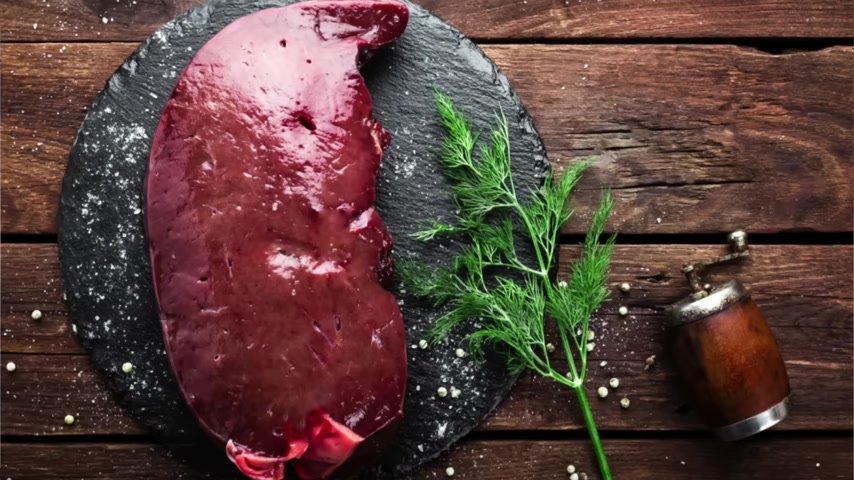
That’s not too much .
The RDAs are the requirements that our body needs .
It’s roughly about 70 milligrams , and this is 27 .
Steak has a vitamin c , but it’s 25 micrograms , right ?
Not milligrams , just a tiny bit .
But mainly if you eat berries , peppers , sauerkraut has the most , is like 10 times more than anything else , or leafy greens , you’re gonna get your vitamin c .
Can you get enough vitamin C from juice?
However , if you get a 100% apple juice , right , it says right here , it’s high in vitamin c .
It says on the back of label , if you drink 1 cup , you’ll get a 100% of the RDAs for vitamin c .
Well , could this be true ?
Well , let’s take a look .
So we have a large apple in 1 cup of apple juice , which comes out to 237 milliliters .
If we take a look at the sugar and we compare it , we have 6 teaspoons of sugar and one apple And we have 7 teaspoons of sugar in 1 cup of apple juice .
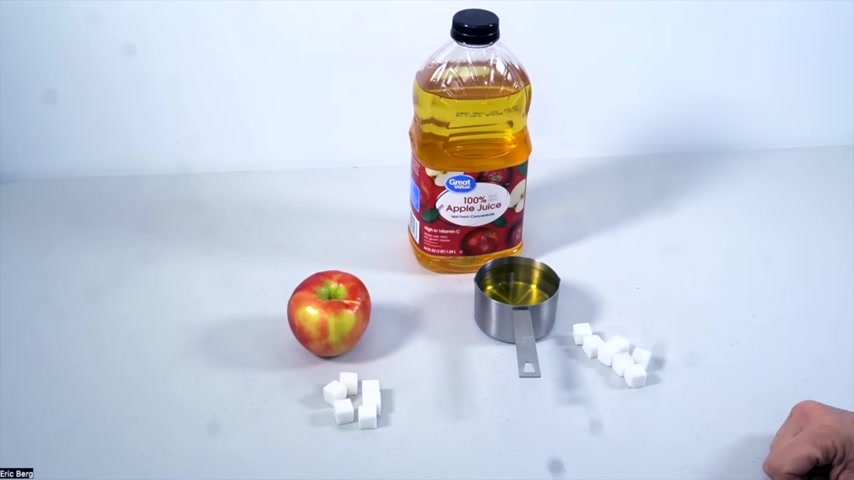
The thing to know about is this thing right here .
This is 1 teaspoon of sugar .
This is how much sugar that we’re supposed to have in all of our blood at any given time .
One teaspoon of sugar .
That’s in our entire system , person consumes , well , I’m not gonna even get into it because it’s just way , way too much .
So if we were to chop this apple up , you know , it’d be roughly like 1 cup .
And so what I wanna show you is the amount of sugar in one apple is almost the same amount of sugar in 1 cup of apple juice .
However , the effect on your hormones from eating an apple versus juice is drastically different .
When you’re consuming juice without the fiber , you’re gonna get a big spike in blood sugars , and you’re gonna get a rebound effect of insulin coming in to push that blood sugar down , which is gonna make you hungry and a little tired about 30 minutes after drinking this juice .
Versus an apple , which has a good amount of sugar , but it also has that fiber which buffers this blood sugar response .
So fiber kind of dampens out the spike in blood sugars .
There’s actually 2 things that will lower this blood sugar insulin response .
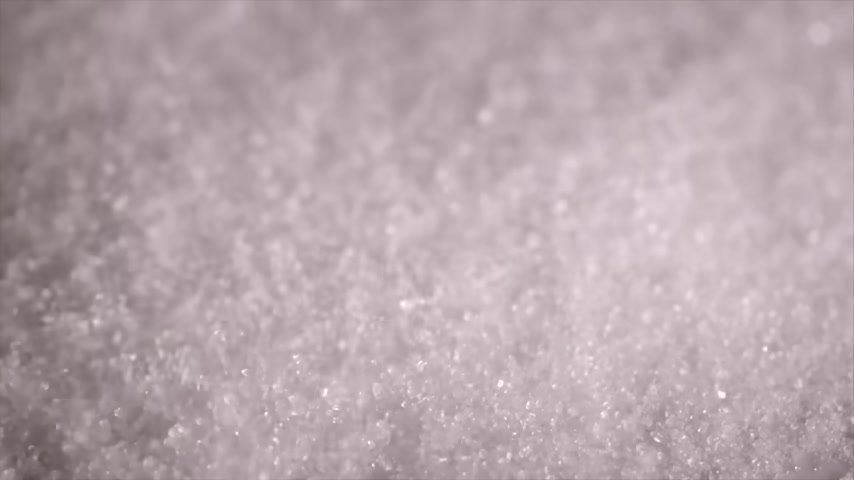
1 is fiber and the other is fat .
So if you were gonna have the choice of consuming these 2 , of course this would be better .
And if you added fat with this , as in maybe some nut butter on your apple , you would buffer the insulin response even more .
And , of course , I’m not recommending this because there’s still a lot of sugar in here .
But if you were to have the choice , this would be a much better choice .
And , of course , adding the nut butter would even be a better choice .
Now what’s interesting about this apple juice , it says a 100% apple juice , not from concentrated .
But if you look really close right here , it’s hard to make this out what this says .
It says with added ingredients .
What are the other ingredients ?
Well , it says apple juice and ascorbic acid .
Ascorbic acid .
Why are they putting ascorbic acid in there ?
Well , the answer lies in the expiration date .
It says September 23 , 2024 .
It’s 2022 right now .
It’s November 2024 .
So this is gonna expire in like 2 years .
How can this sit on the shelf without being refrigerated for another 2 years ?
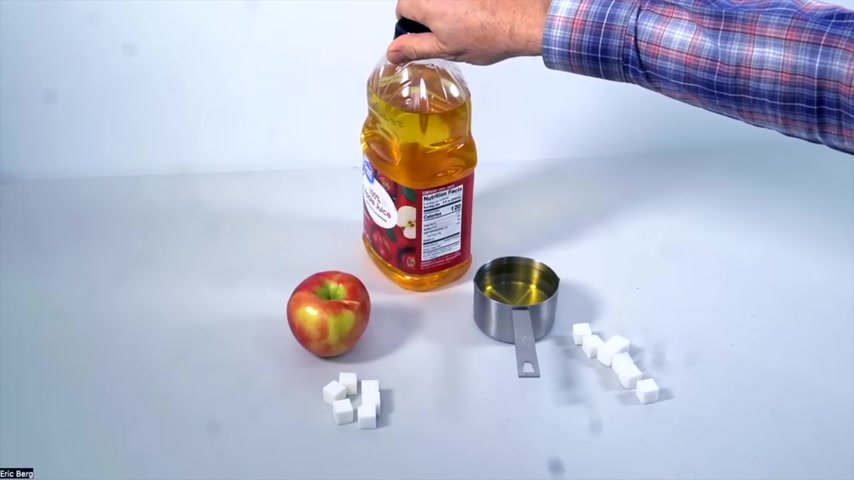
Well , because it’s pasteurized .
That’s heated .
One thing that is interesting to know about vitamin c , it is very sensitive to light and heat .
As in pasteurization .
Even at temperatures at 86 degrees Fahrenheit , you start to break down vitamin c .
The temperatures they use to pasteurize this juice is like a 185 degrees Fahrenheit .
So as you can see , they destroy the vitamin c in apple juice and they have to add it back in there .
So that way on the label , they can say it’s high in vitamin c .
The only problem is the source of vitamin c they’re using doesn’t come from natural apples .
It comes from cornstarch and sulfuric acid .
It’s made synthetically .
It’s out of the normal vitamin c complex .
It’s basically a synthesized version of a part of vitamin c called ascorbic acid .
Key Points:
Commonly known vitamin C deficiency symptoms:
• Bleeding gums
• Fatigue
• Loss of collagen
• Lowered immune system
• Increased risk of biofilms
Vitamins are cofactors that work with enzymes. Without vitamins and certain minerals, important enzymes in the body can’t work.
When you’re deficient in vitamin C your body will allocate the vitamin C you have to the essential enzymes, but not all of them. A complete lack of vitamin C is fatal.
Lesser-known symptoms of vitamin C deficiency:
• Hypochondria
• Depression
• Perifollicular hyperkeratosis
• Anemia
• Dry hair
• Inflamed veins
• Shortness of breath
• Problems with adrenaline
The best sources of vitamin C are fruits and vegetables. Juice, like apple juice, is not a good source of vitamin C. Juice has too much sugar and is pasteurized, which destroys natural vitamin C.
Foods rich in vitamin C:
• Berries
• Peppers
• Sauerkraut
• Leafy greens
DATA:
https://www.sciencedirect.com/science/article/pii/S2352241014000188

